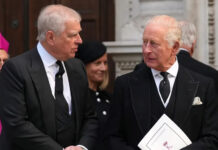When Brian McGilloway, who was born in Derry, traveled “down south” as a child, his family would pass a military border 10 kilometers (six miles) from their home.
Everyone was asked to exit the vehicle by the troops, who then gave an explanation of why they were there.

On the trip back, the same procedure would be followed.
According to McGilloway, military installations near the border vanished after the Good Friday Agreement (GFA) went into effect, often overnight.
The British, Irish, and major political parties in Northern Ireland, including Sinn Fein, the political wing of the Irish Republican Army, signed the political agreement, commonly known as the Belfast Agreement, on April 10, 1998. (IRA).
The Troubles, a period of sectarian strife between the predominately Protestant unionists, or loyalists, who wanted the region to remain a part of the United Kingdom, and the predominately Catholic nationalists, or republicans, who wanted Northern Ireland to join the Republic of Ireland, began in the late 1960s and lasted until the signing of the agreement. The British army was sent in to put down the rebellion in 1969.
More than 3,200 people had died and about 42,000 had been injured by the time the Troubles came to a conclusion.
The GFA was the first agreement that was approved by both populations, notwithstanding past attempts to bring peace to Northern Ireland.
According to Niall Dochartaigh, an author and professor at the National University of Ireland in Galway, “both the British and Irish governments knew that the GFA would be upheld” since loyalist paramilitary forces supported the pact.
Additionally, Dochartaigh claimed that because the GFA “included Sinn Fein and, therefore, the republican movement, it brought an end to the IRA’s campaign and, in turn, the loyalist campaign.”
These paramilitary groups also agreed to maintain their ceasefires and carry out “total disarmament”.
The only major party that opposed the deal was the Democratic Unionist Party (DUP), which has since become Northern Ireland’s largest unionist party.
The DUP opposed, in particular, the provision for the early release of prisoners who had committed violence during the Troubles, which was one of Sinn Fein’s demands.
“We were also concerned that those still connected with violence could gain access to power,” DUP politician Peter James Weir said, referring to IRA members who had become active within Sinn Fein.
The GFA stated, however, that “those who hold office should use only democratic, non-violent means, and those who do not should be excluded or removed from office”.
Source – Aljazeera



